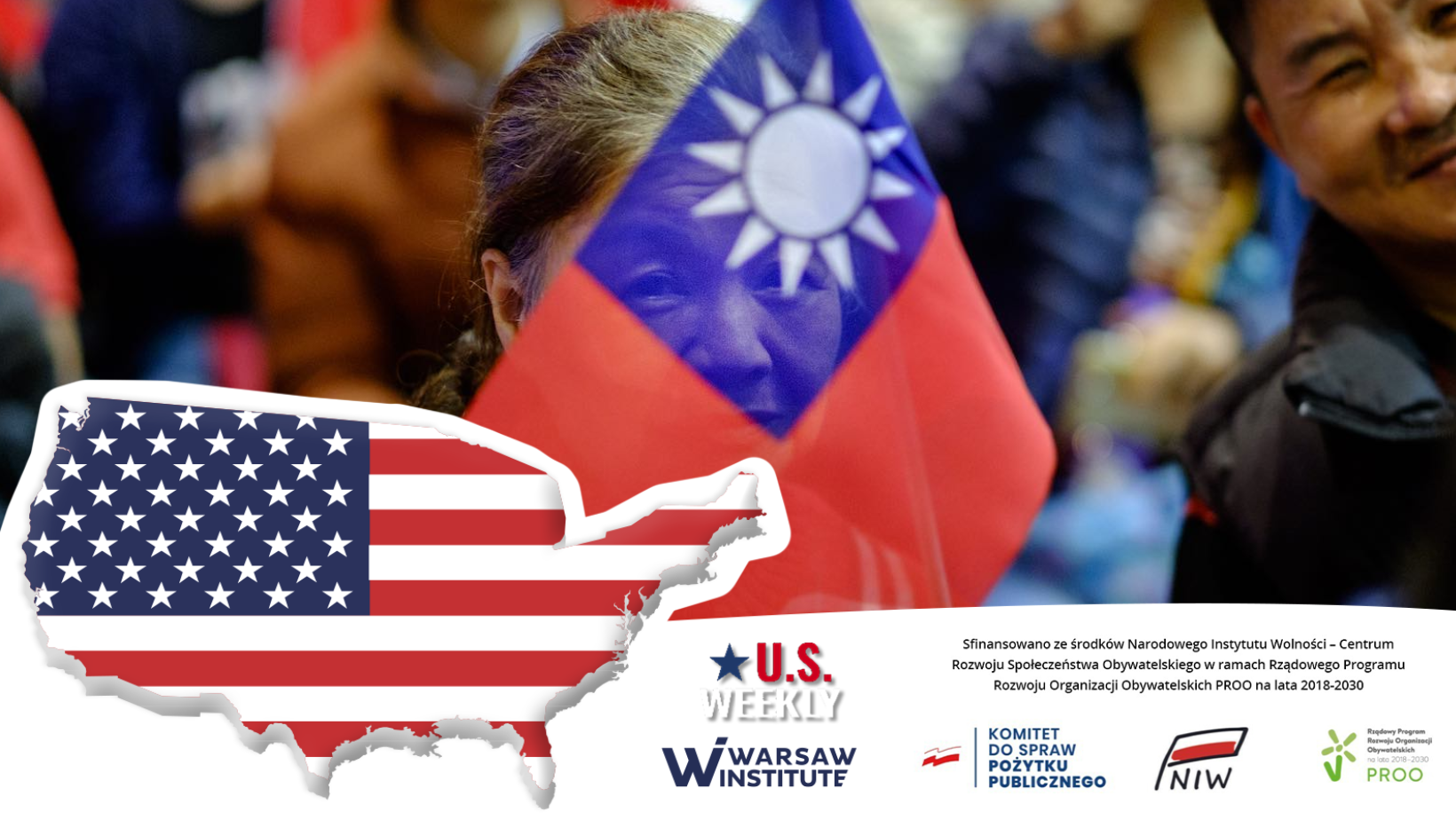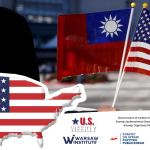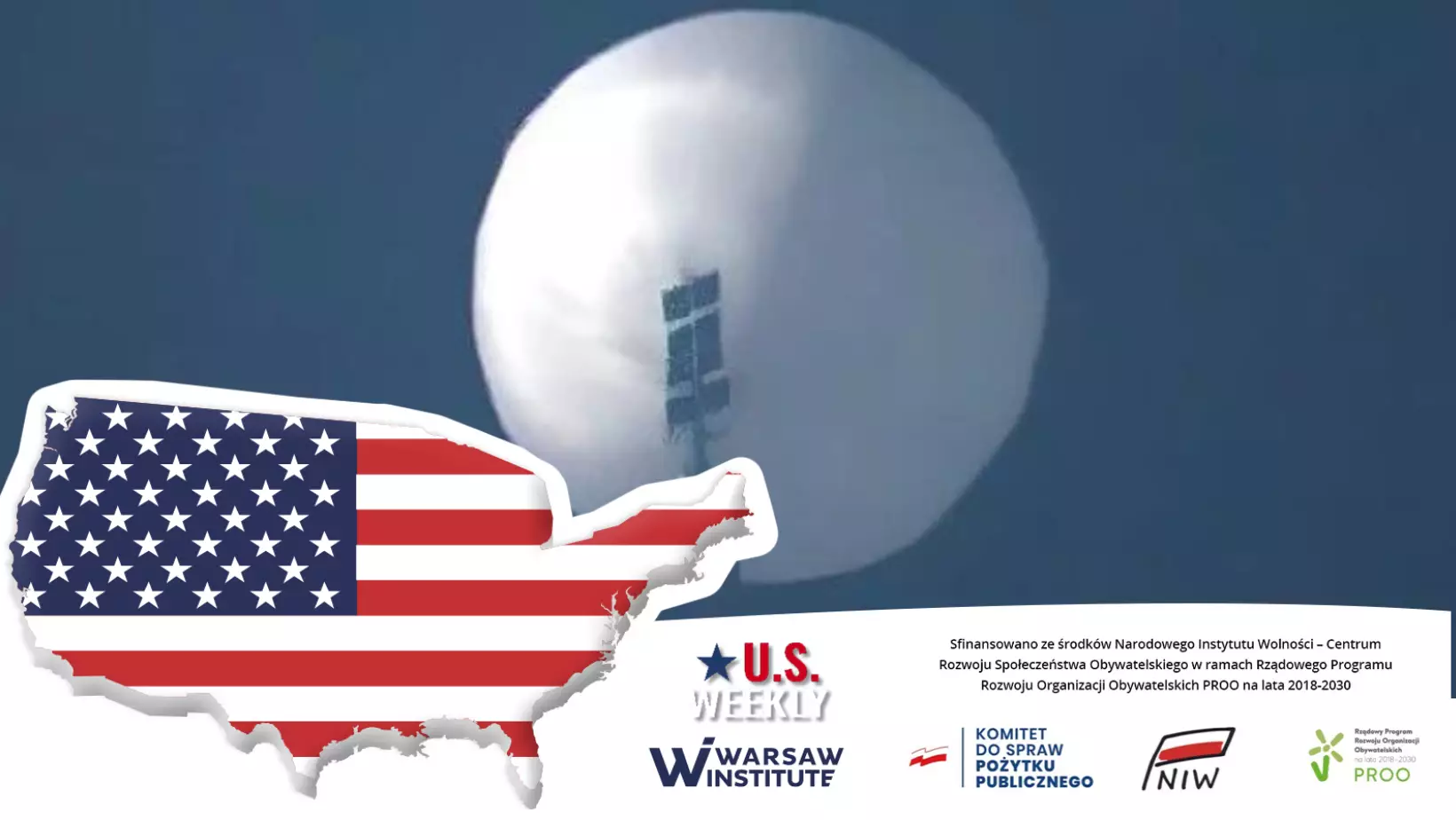
U.S. WEEKLY offers an in-depth analysis of various geopolitical processes that have direct effect on US’ domestic and foreign policies. This particular analytical column is possible thanks to the cooperation with polish media abroad: Dziennik Związkowy – Polish Daily News, Polishexpress of United Kingdom and WIrlandii.pl of Ireland
Date: 31 July 2023
In brief: Taiwan Elections 2024: Key Factors and Points to Watch
As Taiwan gears up for its crucial 2024 elections in January, political dynamics with China and the U.S. are expected to intensify, drawing the attention of both domestic and international observers.

Taiwan has eleven types of elections, including general and local elections typically held every four years, in January and November. Like most presidential elections, Taiwanese elections are mainly driven by domestic issues, with the economy, energy policy, and foreign politics taking a central stage. This time, the January 2024 elections will be contested more than before. After an unprecedented period of cooperation under President Tsai’s predecessor Ma Ying-jeou of the Kuomintang (KMT) party, China-Taiwan relations have reemerged as a dangerous political and military flash point.
In April, the Democratic Progressive Party (DPP) elected Vice President William Lai Ching-te as its nominee presidential candidate for the ruling DPP in next year’s election. Ching-te will run against Hou Yu-ih (KMT), the new Taipei City Mayor. The presidential candidates have different strategies for preserving peace in the region and with China. While Lai has a more traditionally aligned stance favoring the pro-independence wing, Yu-ih follows the KMT-preferred conciliatory approach with China, who opposed the idea of Taiwan’s independence and Beijing’s “one country, two systems”. Known as the party with the best working relationship with Beijing, the KMT is willing to pursue a strong “True Blue” policy focused on maintaining Taiwan’s de facto independence under a de jure “Republic of China” designation. A strong “True Blue” policy envisages a stable yet departed relationship with the U.S. in comparison to a more marked distancing proposed by the “deep Blue” KMT faction. On the other political spectrum, the Taiwan People’s Party (TPP) figures as an alternative to the historical rivalry between the DPP and KTM. Since 2019, the TPP’s candidate Ko Wen-je — a former DPP militant — shared in an interview with Nikkei Asia, that Taiwan’s “status quo” of de facto, but unofficial, independence is the only realistic option at the moment.[1] Recent polls position the TPP ahead of the KMT, becoming a popular alternative among young people.
Now that eyes have turned with increasing concern towards the Indo-Pacific and Taiwan, Washington will be closely looking at the current presidential candidates. Taiwan’s presidential elections can directly affect America’s politics and economy in the region and beyond. Departing from the economic importance of the region—the region dominates 50 percent of the world’s maritime trade— Washington’s interests strategically converge with countries like Japan and India seeking to balance China’s rising encroachment in the region.
To set it in perspective, most of the recent conversation on Taiwan and the Indo-Pacific revolves around semiconductors, the chip industry, and maritime transit. However, the region consists of 38 countries—constituting a large share of the world population and global gross domestic product (GDP)—making it a key player in both product and factor markets.[2] As part of this equation many country islands, for example, East Timor, are unable to adequately participate in regional trade due to a lack of proper digital connectivity and investment. Similar country islands find themselves in this position, cumulatively leading to a rise of regional inequality. The rise of sea levels, food prices, and regional tensions further exacerbate the wave of obstacles faced by these countries. Locked-in conditions and asymmetrical deals with China, temporarily liberate countries like the Solomon Islands that later must retribute in kind.
Further geopolitical implications of Taiwan’s presidential elections can potentially affect Europe’s relations with China as well. For instance, Germany’s recently published strategy on China highlights its intentions in maintaining the status quo in the Taiwan Strait. German Minister for Foreign Affairs, Annalena Baerbock, said that “for Germany, China remains a partner, competitor, and systemic rival, but the aspect of systemic rivalry has in recent years increasingly come to the fore.”[3] Despite labeling China a systemic rival in 2019, the EU’s most sensitive economic sectors still, heavily depend on China for raw materials (lithium and magnesium). Thus, as Europe continues to depend on China for crucial raw materials, Taiwan’s election outcome may influence the EU’s approach to dealing with China’s rise.
Washington, Beijing, and Taipei relations are guided by a fine ‘agreement to disagree’ over the ‘One-China Policy’ with each side defining ‘China’ differently. For instance, the “1992 Consensus”, is an agreement between the KMT and the Chinese Communist Party (CCP) stating that there is only one China. However, both sides maintain a different understanding of ‘China’. While the People’s Republic of China (PRC) refers to mainland China, the Republic of China (ROC) refers to Taiwan. Overall, the DPP rejects this consensus as a whole.
The United States maintains formal relations with the PRC and has unofficial relations with Taiwan. As part of the equation that has guided U.S. policy on Beijing and Taipei since 1979, top Taiwanese officials are not allowed to make official visits to Washington. Notwithstanding, Taiwan’s President Tsai Ing-wen visited the United States in late March and early April 2023, meeting with Kevin McCarthy, speaker of the U.S. House of Representatives, in California. Perceived by the public as a deviation from the standing tradition, the Tsai-McCarthy meeting resulted in a predictable reaction from Beijing, launching unprecedentedly large military exercises surrounding Taiwan, firing eleven ballistic missiles over the island, conducting cyber-attacks on the island, and imposing import bans on Taiwanese goods. Notwithstanding, candidate Lai (DPP) has not changed his plans from stopping over in the U.S. on his way to and from the inauguration of Paraguay’s president Santiago Peña on August 15.[4]
Taiwan has prepared for a potential Chinese attack by strengthening security ties with like-minded democratic countries, including the United States, Australia, Japan, and the Philippines. So, there is no doubt that the China policy will figure into Taiwan’s presidential election next January. Within the broader context, Taiwan’s stance towards mainland China has consistently influenced voters’ decisions and can significantly impact electoral outcomes. This time, voters might position the rising frustration over the cost of living and regional security guarantees at the center of the elections. Would voters consider settling with the KMT if this means the illusion of peace? Ultimately, the chosen candidate will wield the power to determine the trajectory of Taiwan’s relations with China, influencing not only the island’s fate but also broader regional dynamics.
[1] Alyssa Chen. “As Taiwan gears up for 2024 presidential poll, who are the top candidates?” The Japan Times (June 5, 2023).
[2] Kumar Ambar Ghosh, Debosmita Sarkar, and Anasua Basu Ray Chaudhury, “Security, Economy, and Ecology: Setting Priorities for Cooperation in the Indo-Pacific,” Observer Research Foundation (February 25, 2022).
[3] AP Berlin, “Germany publishes new China strategy” Taipei Times (July 14, 2023).
[4] Guy Chazan and Laura Pitel in Berlin and Patricia Nilsson “Germany warns companies to reduce dependence on China” Financial Times (July 13, 2023).
Katja-Elisabeth Herrmann Katja-Elisabeth works as a research fellow at the Warsaw Institute. She graduated with an MA in Transatlantic Affairs from the College of Europe (Warsaw, Poland) and the Fletcher School of Law and Diplomacy at Tufts University, cross-registering as a student at the Harvard Kennedy School of Government (Boston, MA). Additionally, Katja-Elisabeth holds a BA in International Relations and International Organizations, which she combined with a degree in International and European Law (LLB) from the University of Groningen.
Her research is mainly devoted to transatlantic security and defense topics, particularly emerging and disruptive technologies. She was recently awarded the Squire Patton Boggs Foundation public policy fellowship in 2022 to conduct research on U.S. domestic politics and the Three Seas Initiative. She is also interested in cybersecurity and crisis management.
She recently presented her research at the Fletcher School on semiconductor technologies’ political and industrial landscape in the U.S. and the EU. She will continue her research, focusing on the challenges and opportunities for military procurement for NATO allies.
Sources:
1. Ambar Kumar Ghosh, Debosmita Sarkar, and Anasua Basu Ray Chaudhury, “Security, Economy, and Ecology: Setting Priorities for Cooperation in the Indo-Pacific,” Observer Research Foundation (February 25, 2022). https://www.orfonline.org/research/security-economy-and-ecology/
2. AP Berlin, “Germany publishes new China strategy” Taipei Times (July 14, 2023). https://www.taipeitimes.com/News/front/archives/2023/07/14/2003803163
3. Chazan Guy and Laura Pitel in Berlin and Patricia Nilsson “Germany warns companies to reduce dependence on China” Financial Times (July 13, 2023). https://www.ft.com/content/2f6ed20f-4095-4481-895d-39128c2d384e
4. Chen Alyssa. “As Taiwan gears up for 2024 presidential poll, who are the top candidates?” The Japan Times (June 5, 2023) https://www.japantimes.co.jp/news/2023/06/05/asia-pacific/politics-diplomacy-asia-pacific/taiwan-2024-presidential-election-candidates/
5. Grossman Derek. “Upcoming Presidential Election Will Clarify Taiwan’s China Policy” RAND (May 19, 2023). https://www.rand.org/blog/2023/05/upcoming-presidential-election-will-clarify-taiwans.html
6. Hille Kathrin. “Taiwan election candidate risks China’s anger with planned US trip” Financial Times (July 17, 2023). https://www.ft.com/content/2f6ed20f-4095-4481-895d-39128c2d384e
7. Roctus Jasper. “Between Taiwanese Elections: The KMT’s Quest for True Blue” Egmont Royal Institute for International Relations (March 2, 2023).
https://www.egmontinstitute.be/between-taiwanese-elections-the-kmts-quest-for-true-blue/
8. Sevastopulo Demetri and Hille Kathrin. “Washington presses Taiwan presidential frontrunner on White House comments” (July 19, 2023). https://www.ft.com/content/ff4b4d70-0e81-4229-bd7f-3224ed538428
9. Wang Cindy and Samson Ellis. “Why Taiwan’s 2024 Elections Matter From Beijing to Washington” Bloomberg (April 17, 2023).
https://www.bloomberg.com/news/articles/2023-04-17/explainer-taiwan-2024-elections-and-why-they-matter-from-beijing-to-washington?in_source=embedded-checkout-banner
Support Us
If content prepared by Warsaw Institute team is useful for you, please support our actions. Donations from private persons are necessary for the continuation of our mission.
All texts published by the Warsaw Institute Foundation may be disseminated on the condition that their origin is credited. Images may not be used without permission.

















